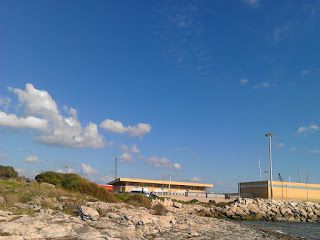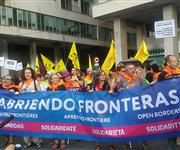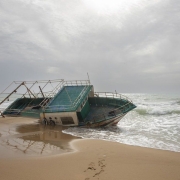Racist Laws and Daily Discrimination. Scenes of Every Day Violence in Eastern Sicily.
The Italian government is implementing a policy of racism and border of closure: deals with Libya, distinctively discriminatory official circulars, and the recent decree which was approved yesterday by the Council of Ministers. The decree introduces new measures for “speeding up the procedure to grant asylum to refugees”, clearing the way for the “utilisation” of migrants for unpaid labour on public works, and increasing the number of complexes for identification and “permanent” repatriation, centres which from today will be classed as Repatriation Centres (CPR*) instead of the old Identification and Expulsion Centres (CIE*).
The process of eroding migrants’ rights continues apace. Protests and anger is spreading across Italy in light of these latest manoeuvres, which we hope truly signal an awakening to the dramatic situation in which we find ourselves, and not simply the usual pretext for pointlessly taking ideological positions, or mere posturing.
Whether we like it or not, in fact, the policies revealed by our governments hide, buried within them, a historical, economic and social context which all of us, as civil society, have been placed in. Institutional decisions no doubt mirror the interests of the few, changing according to Europe and Italy’s economic and political needs, but they also draw on the daily practices and shared thinking of, and gain support from, those of us citizens who condone and reproduce our politicians’ thought and actions.
The racism and discrimination which migrants face is perpetuated by laws both written and unwritten, laws which are made explicit from the moment of rescue and arrival. Last week several hundred people were landed on the coastline of Eastern Sicily, 1,500 people arriving at the port of Augusta alone in the space of two days.
And it is in Augusta itself that one of the most shameful and worrying chapters in the story of Sicilian “welcoming” is taking place: hundreds of migrants, including families with small children, minors and pregnant women, amassed in the port’s tent-city for at least two nights. There are no beds in the tent structure, nor even enough blankets. There is no form of heating, and they remain without light throughout the night, awaiting a moment of peace and calm after the sea crossing. This is an inhumane situation which has repeated itself month after month, accompanied by the usual hypocritical justification by “emergency”. Lack of rights becomes the norm, and for the humanitarian staff this situation becomes “inevitable”, remaining – at least officially – unreported.
We know all too well that this is only happening because it’s about migrants. It’s useless to repeat that this abuse and illegality is experienced by the voiceless, and that it would never be acceptable if it were perpetrated against Italian citizens. Whoever maintains hypocritically that such a system is the only possible solution would be unlikely to form the same thought if their own family were involved.
The main countries which people are arriving from now are Nigeria, Guinea and Senegal, but also Syria, Palestine, Pakistan and Morocco. In Augusta, in the moments which fall between the landing and the deplorable living conditions we have just described, the “selection” between migrants with “the right to protection”, and those who are to be rejected, begins. A nationality lottery, without any recognition of the experience of the Libyan war, or the right to legal defence. And so this time around, as happens across the island, groups of young Moroccans were left in the middle of the street with a rejection notice in their hands. Some of them will pass through Catania, moving according to a hazy sense of direction but a clear desperation, in search of somewhere where they can find a momentary escape, one which our country has decided not to guarantee them.
Expulsion, the sword of Damocles which hangs over migrants’ heads, encourages many to collaborate with the police, in the hope of obtaining better treatment in exchange for a name. And so the arrests of the “alleged boat drivers” continue, people frequently forced to take the helm but incapacitated from being able to reveal their reasons by themselves, subjected to inhumane and degrading treatments, at last until they meet with a good lawyer. The discrimination which confronts migrants is strengthened by the prison environment: as well as frequently being unable to understand their situation due to the lack of interpreters and mediators, migrants are isolated in prison, destined for the more humiliating work, and badly treated by the rest of the prison population. As some of the staff at a prison in the province of Catania tell us, drug use and abuse is widespread. The aim is to sedate and domesticate people’s awareness, rather than to contribute to people’s well-being.
Minniti, the Minister of the Interior, has cleared the way for local councils to “use voluntary and unpaid labour for public works”, making the brave step away from “integration” and into a practice which has the feel, instead, of a legalised exploitation of migrant man-power. In the meanwhile, apropos of social inclusion, we know how difficult it is for unaccompanied foreign minors to regularly attend school. There have been various accounts by
staff who confirm for us that even in a large city like Catania, the head teachers do not allow the young migrants into the classes, but only to take the final exams. This is particularly important for the 16 year olds, who have to attend school, and for whom the frequency of the lessons is fundamental from a pedagogical standpoint, as well as for social integration.
From one illegal and discriminatory practice to another, and among newly announced laws and daily violence which passes by in silence, a generally unwelcoming climate of exclusion is being gradually consolidated. Cultural labour which might involve Italians and new arrivals is thus more urgent than ever, in order to follow up the anger and complaints with the possibility of truly different approaches, and the strengthen those seeds of change which already exist.
Lucia Borghi
Borderline Sicilia
Project “OpenEurope” – Oxfam Italia, Diaconia Valdese, Borderline Sicilia Onlus
*CPR = Centro Permanente per il Rimpatrio (Repatriation Centre)
*CIE = Centro di Identificazione e Espulsione (Identification and Expulsion Centre)
Translation by Richard Braude



